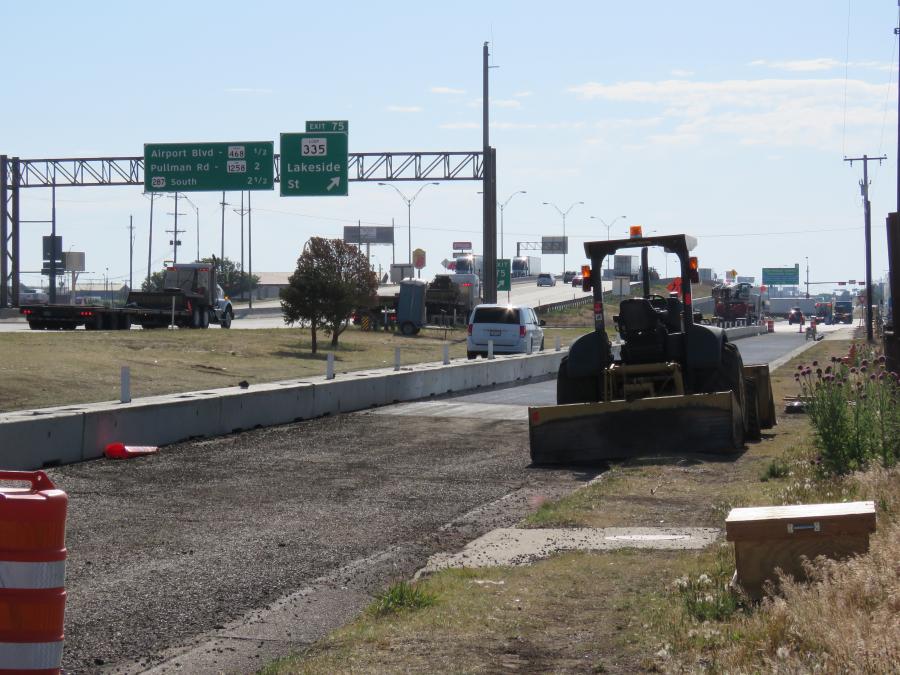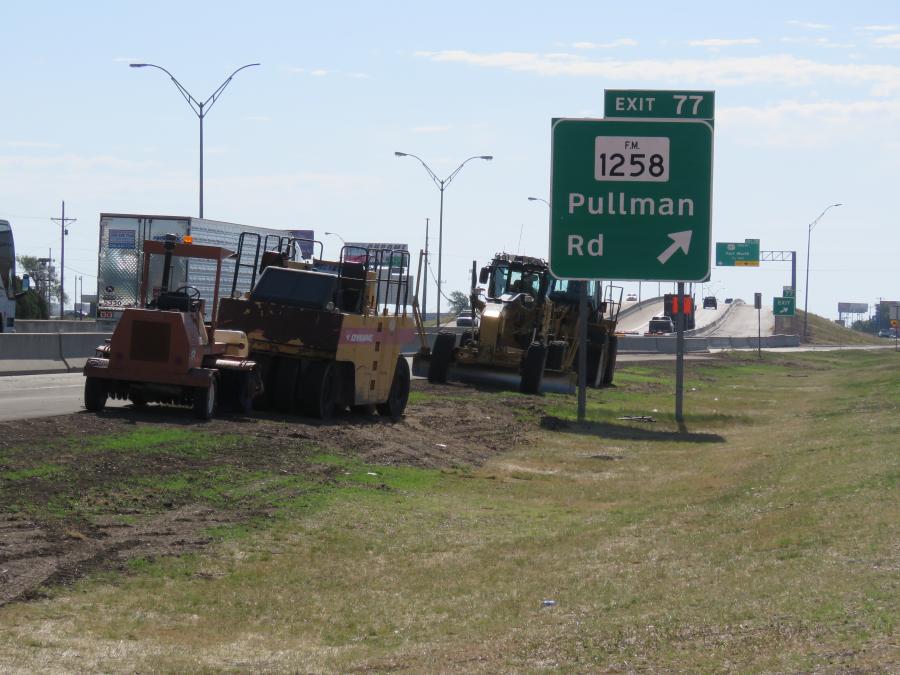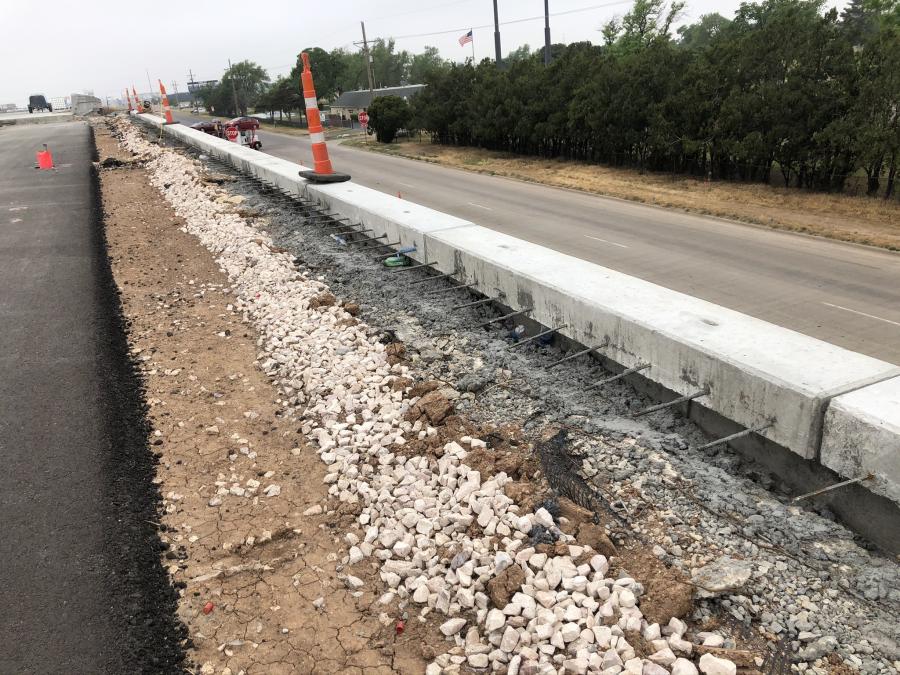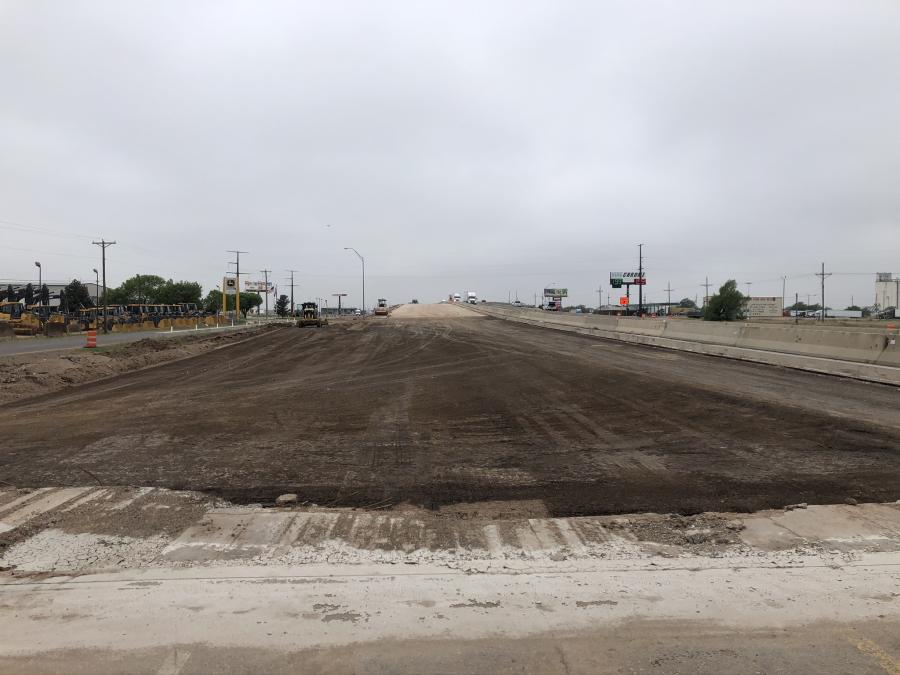The GOMACO 2800 Slipform paver was used for the reconstruction of six bridges on I-40. According to the general contractor, J. Lee Milligan, it is the go-to piece for concrete paving.
The replacement of aging infrastructure that has maximized its lifespan, particularly bridges, in the Greater Amarillo Area is a major priority for the Texas Department of Transportation (TxDOT).
In February 2018, J. Lee Milligan Inc. (JLM) was awarded a $50.4 million contract for the reconstruction of six bridges on I-40, just east of downtown, at Whitaker Road, State Loop (SL) 355 (Lakeside Drive) and FM 1258 (Pullman Road).
Construction Progress
So far, J. Lee Milligan has completed the following elements: the WB bridges at Whitaker, Lakeside and Pullman and the EB bridge at Pullman, and the concrete paving the approaches at Whitaker and Lakeside. The benchmarks for the remainder of the work are switching traffic and starting on the EB bridges at Whitaker and Lakeside in early August. Current activities include paving the WB on and off ramps with 13-in. CRCP and placing rip rap on the west side of Whitaker and the installation of guardrail east of Whitaker.
"I-40 is a major freight corridor and the challenge is keeping the impact to our customer and stakeholders to a minimum is vital," said Roy "Corky" Neukam, TxDOT's Amarillo Area Engineer. "The overall work is good, high quality in terms of workmanship."
Access to the various work sites (road and bridge) is limited due to the one-way frontage roads, but TxDOT is doing what it can to help the general contractor bring materials and equipment in and out of the job sites.
"The working relationship is built on partnering and common goals for achieving a good quality product," said Neukam.
Equipment
This is an equipment-driven job and a GOMACO 2800 slipform paver is playing a key role in the construction. "It's the workhorse in Texas for concrete paving," said Neukam.
The bridge work is based on demolition and reconstruction, a process that spans several months.
"This is a six-lane interstate with frontage roads and to demolish and rebuild the WB bridges, we had to shift traffic to the EB lanes," said Neukam. "In general, demolition took 10 percent of the time to replace a bridge. The construction process is based on installing the MSE walls and embankment; drilling shafts and putting in columns and caps, aiming beams, placing precast concrete panels, and tieing steel; and pouring the concrete deck, along with your bridge rails. About 200 soil nails were placed for each of the MSE retaining walls that were installed and the drilling machines were crucial to getting it done.
"The work is going smoothly," he added. "Our contractor and subcontractors are very skilled and they know what they are doing. The bridges are located on a straight corridor and you have to consider the travelling public and stakeholders by providing exit and entrance ramps for all the businesses. We ensured that when one bridge was closed, that we could provide access to both sides of the frontage roads on the remaining one."
The road work associated with the bridge work is proceeding well and should be completed in the last quarter of 2021.
Project's Purpose
The initiative is designed to improve traffic operations, mobility, and safety along a 4.26-mi. portion of the I-40 corridor. The work also includes the reversal of the westbound ramps between Spur 468 (Airport Drive/Juett Attebury Drive) and Whitaker Road, and ramp profile modifications of the remaining ramps.
The work zone in Potter County extends from west of Whitaker Road to the U.S. 287 split.
The six bridges, which are crucial to traffic flow for commuters and commerce, were built in the late 196os. They are still safe to drive on, but can longer carry oversized trucks and those carrying loads above 89,000 lbs.
TxDOT inspected 12 bridges in the Amarillo area in 2015, 2017 and 2019.
"The inspections indicate the deck and other concrete elements are suffering from chloride damage from road salts," said Kit Black, TxDOT's director of transportation, design and engineering, Amarillo district. "This chloride damage is causing the load rating to be lower than the design value. Further decline of the load rating would cause the bridges to be load posted, limiting the weight of the freight allowed to cross the bridges. Since this is interstate traffic, this would cause major disruption to cross-country freight traffic. I-40 is the primary east-west freight corridor between IH 20 and IH 70. There are few, if any, alternatives."
The reconstruction has broad community support.
"This project has involved several stakeholders from truck stops to restaurant chains to tire and car dealerships," said Sonja Gross, public information officer for TxDOT's Amarillo District. "TxDOT involved these partners early in the process through a series of public meetings and continues to keep in constant contact through traditional and social media, e-mail updates, in-person meetings as requested and other means. We couldn't do a project of this nature without the support of our stakeholders and we appreciate their continued support and patience as we work to deliver a quality project that will ultimately benefit them and their customers in the long run."
Instead of breaking the work into back-to-back contracts, they were combined as the work was similar for all three locations and, most importantly, it is expected to shorten the construction time, save money, and minimize traffic impacts.
The old steel continuous I-beam type bridges are 180-190 feet long with three lanes, and the new bridges are based on prestressed concrete I-girder design with three lanes.
The bridges and road infrastructure were designed by WSP USA, Inc.
"Minimizing impact to traffic, businesses, and the public is always a major goal for TxDOT, and doing so on an interstate with a large volume of truck traffic is sometimes a challenge," said Black. We planned and implemented phased construction for these bridges in a way that minimized this impact. Seventy years is the minimum design life we hope to see for these bridges. Mechanical stabilized earth retaining walls and soil nails with fascia were used for this project. These methods minimize depth of construction and, therefore, decrease the time for construction."
The traffic management plan is based on switching traffic from the bridges that have been and are being demolished and detours.
"Roadway work zones can be hazardous, both for workers and motorists who drive through the complex array of signs, barrels and lane changes," said Gross. "We are reminding motorists to always be attentive, drive with caution, and always follow posted work zone speed limits."
Peak days have between 50 and 60 JLM and subcontractor employees at multiple sites. The subcontractors are Barricades Unlimited, Antigo Construction INC., HJC Farms Inc., M&D Foundation Drilling Industries, Primate Construction LP, Alamo Brothers Concrete Inc., Wolfe Construction Group, Oscar Orduno Inc., Electric Co., LP, LA Fuller & Sons Construction Ltd., MCL Contracting LLC, Slaton Brothers Inc., MICA Corporation, Willis Electric Co., LP, Bowman Engineering & Consulting INC. (Tier 2), M&D Foundation Drilling Industries, Fusion Communications LLC, Alamo Brothers Concrete Inc. and Toro Bravo Construction LLC.
The amounts of concrete, steel, and asphalt being removed via excavations and demolitions and new construction are still being tallied.
Materials are being recycled on-site.
"They are being recycled through recycled asphalt pavement," said Neukam. "We mill that up and incorporate that into our new mix."
"TXDOT has several recycling efforts throughout the year, whether they're internal or external on job sites," said Gross, "because we know the importance of protecting this environment in which we inhabit and we'll continue to be good stewards of it."
JLM is using cranes, excavators, dozers, loaders, rollers, pavers, and other standard construction equipment. Some of the equipment is manufactured by John Deere, Dynapac and GOMACO.
Neukam, who has been with TxDOT for 12 years, has been involved in many projects.
"I've learned and expanded on customer service and dedication to our stakeholders," he said. "The importance of business along our frontage roads is something we recognize and we have to mitigate and reduce the amount of delays and impacts to any of our customers and stakeholders."
Completion of the project, which began on April 1, 2018, is expected in September 2022. While multiple funding sources are involved, Propositions 1 and 7 that were approved by Texas voters in recent years has allowed TxDOT's Districts, including Amarillo's 17-county District, to greatly address aging infrastructure. CEG
Irwin Rapoport
A journalist who started his career at a weekly community newspaper, Irwin Rapoport has written about construction and architecture for more than 15 years, as well as a variety of other subjects, such as recycling, environmental issues, business supply chains, property development, pulp and paper, agriculture, solar power and energy, and education. Getting the story right and illustrating the hard work and professionalism that goes into completing road, bridge, and building projects is important to him. A key element of his construction articles is to provide readers with an opportunity to see how general contractors and departments of transportation complete their projects and address challenges so that lessons learned can be shared with a wider audience.
Rapoport has a BA in History and a Minor in Political Science from Concordia University. His hobbies include hiking, birding, cycling, reading, going to concerts and plays, hanging out with friends and family, and architecture. He is keen to one day write an MA thesis on military and economic planning by the Great Powers prior to the start of the First World War.
Read more from Irwin Rapoport here.
Today's top stories




















